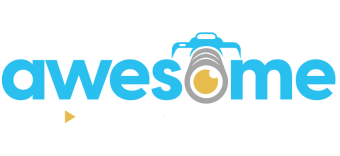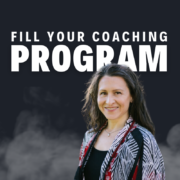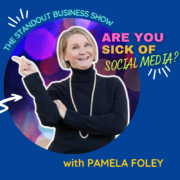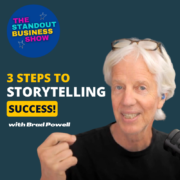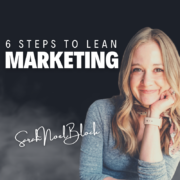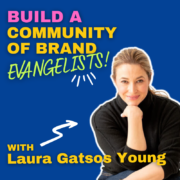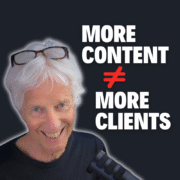171. The NEW Health Coach Marketing Strategy JUST FOR PRACTITIONERS – with Kelly Lubeck
If you don’t charge your iPhone at night, you’re not gonna have a phone in the morning,
and it’s the same for you!
If you’re going to show up the next day, you’ve gotta keep your batteries charged.
(Agree or disagree?)
“The more we show up well in the world, the more it allows us to make a bigger impact.”
That’s the motto healing practitioner, Kelly Lubeck, lives by.
She runs her healing practitioner business under the tagline: “The world needs you well”
Her work is devoted to unraveling the secrets of resilience and well-being for entrepreneurs and change-makers.
In this coaching style episode I’m helping Kelly break down how she can stand out amidst all the other health practitioners out there and avoid the biggest mistake that most health coaches make when it comes to their marketing.
Key Takeaways:
✅ Selling signals of interest instead of pitching your offer
✅ Using your coaching as your marketing
✅ The benefits of live streaming to help grow and nurture your audience
Resources
Take the Standout Business Scorecard & get the steps to create an Unforgettable Brand in just 5 minutes: https://awesomevideomakers.com/scorecard/
Transcript
Brad Powell:
Welcome to the Standout Business Show, where it’s all about making a bigger difference by doing business differently. I’m Brad Powell and today we’re doing a special episode, which is a coaching style episode. I’ve got a friend and healing practitioner. Her name is Kelly Lubeck. She’s on a mission to help people like us entrepreneurs, who tend to be working all the time, stressing out about everything we do, climbing the long mountain to entrepreneurial success, and along the way, we often forget how to take care of ourselves and we leave behind the idea of you have to be healthy if you’re going to actually show up the next day. I like to use the metaphor of you know, if you don’t charge your iPhone at night, you’re not going to have a phone in the morning, and it’s the same with yourself. There’s a lot of things that we need to do for ourselves that keep us energized and keep us in basically, a good state of well-being. This is really Kelly’s work, and we’re going to talk about Kelly’s place in the world of healing practitioners, which is a very busy space, so let’s start the show.
Brad Powell:
Before we get started, I want to announce that, after three years and over 160 interviews on this show, I’ve just created a self-assessment tool that I’m calling the Standout Business Scorecard. The scorecard lets you rank yourself on how much your business stands out and will give you personalized recommendations based on your score from several of my past guests. So to find out your standout business score, just go to awesomevideomakerscom slash scorecard. I’ll say that again awesomevideomakerscom forward slash scorecard. It’s quick, it’s free and you can thank me later. And now back to the show. Kelly, welcome to the show.
Kelly Lubeck:
Thank you. I’m so glad to be here with you, Brad. Thanks for having me.
Brad Powell:
Yeah, well, to get us started, I just would like to imagine that we have some sort of magic wand and I could wave that magic wand and I could say well, let’s imagine six, eight months from now, somewhere beyond the middle of 2025, next year, and everything that we either talked about today and other stuff that you’re putting in place for your practice, was going really well. What would that look like for you?
Kelly Lubeck:
What that would look like.
Kelly Lubeck:
I’m very drawn forward by a sense of mission and purpose, for sure, and my work, my line that I put in every single email that I send to my community is the world needs you well, and I feel like really really living into that piece and understanding that the more that we take care of ourselves, the more that we heal our own nervous systems, the more that we show up well in the world, the more that it allows us to make a bigger impact out in the world, and so right now, I have a number of different ways that I work, but one thing that I’m dreaming up and dreaming into being is a collective space.
Kelly Lubeck:
It’s all about rooting into our own resilience and finding ways for all of us, whatever kind of change-making we’re doing, which also includes parenting and caregiving. But the ripple that we’re making out in the world is made even stronger because we’re rooted in resilience, and so what I would see as success halfway into 2025 is to have this solid community built where people are dropping in a couple of times a month to really remind them to do deeper healing work and remind themselves of the iPhone charging at night, the work that we need to do ongoing Support ourselves and sustain ourselves and grow our resilience and grow our capacity to be out in the world and be delivering the life-changing work that we’re doing.
Brad Powell:
Yeah, all right. So, from a business model perspective, tell me a little bit about what that looks like in terms of when you say collective and the way that you work with people. Like how big does that need to be in terms of you know how you work with people. Like how big does that need to be in terms of you know how you work with people and how you charge them and and how you actually support yourself from this work you’re doing?
Kelly Lubeck:
Yeah, so my dream is to have 108 people in that collective 108.
Brad Powell:
Okay.
Kelly Lubeck:
It’s a sacred number. So I would love to have 108 people there, and I think it’s going to be launching in the early part of next year and so I know it’s going to take a little time to get growing, but I have lots of curriculum already to deliver and a lot of ideas about how this is going to roll out and visions for it specifically. So I know that there will be an initial test phase and then my hope and plan is for it to be growing. So I would love to have 108 people. I would also love I have my program Befriend your Body, which is a more intensive 12 week program, which there are pieces being woven into the Roots of Resilience Collective that are going to include that.
Kelly Lubeck:
So there’s a little bit of that under construction, but that I would love to see that program thriving because it is so life-changing for people Like I have people coming back saying, oh my gosh, my parenting is different, the way that I’m walking in the world is different, I’m taking care of myself differently, I understand my nervous system, reactions to stressful events and I know what to do now and that it’s so exciting to me to see the ripple effect of that work. So I would love to you know be rolling that out a few times a year with, you know, a good 20 people in there, so they get the attention they need and it’s also kind of a full community that really learns from each other as well. And then in there is also the private work that I do with clients and I offer speaking engagements and retreats to organizations as well. So the bigger picture of the business is that all of those different pieces.
Brad Powell:
Okay, well, right now, how are people finding you? What are you doing so that people know about your work and will know about these upcoming projects that you’re doing?
Kelly Lubeck:
Yeah, so most of my work is most of my client and student base is from referral. To be honest, I send out regular newsletters. I have been I have a smallish list and I’ve been writing fairly regularly for a few years now. I started in 2020. Before that, the last one I’d written was, I think, in 2012. So in 2020, I started getting more regular, 2024, I’m definitely more on the regular side and I’ve been sharing via email about different offerings I have, which is a newer way of doing it.
Kelly Lubeck:
But much of my work it’s pretty high touch and much of my work has been making phone calls and reaching out to people and checking in with you know, past students or current past students or clients or current students and clients through other people’s podcasts or events. Like our mutual friend Mia, I’ve been on many of her events and I teach in her space and then when I deliver speaking engagements for organizations, people also find me there. I’ve done a little bit of dabbling on. I mean, I’ve written things on social media. I post my newsletters. I have never done a live on social media, but I have um put video clips of a few different things up. Just this last summer I finally, or this fall. I managed to do that all right.
Brad Powell:
All right.
Brad Powell:
So I hear you’re doing an email pretty regular email and you’re also doing some things where you’re out in the world, like you’re doing speaking engagements. Or you’re also doing some things where you’re out in the world, like you’re doing speaking engagements, or you’re collaborating with partners like Mia, yeah, and that all sounds great. One thing for you to consider when you’re looking at reaching out to new people and bringing them into your realm there’s this tendency amongst folks either when you’re sending up something like an online course, you know the creator goes into the woodshed and they spend a bunch of time in there doing the stuff of building the curriculum and putting all the videos together and all the lesson plan and all the other stuff and you’re building on some kind of course platform and then, when that’s all done, then you come out to your audience and just say here it is.
Brad Powell:
I got this thing.
Brad Powell:
And it costs this much and you’re going to love it and come on and buy it. Why don’t you buy it now? What that does, no matter how good it is, is it sets up this very binary proposal. It’s either well, I can buy this or I can not buy it, and most people, just because of where they’re coming from and how busy their lives are, and whether they’re ready or not to do this at the moment, they’re not going to say yes right away. Only a few people will do that and, as a result, most of the new, brand new online courses don’t necessarily do very well.
Brad Powell:
I don’t know what the statistics are, but my guess is the great majority of online course creators, when they go to launch a course, it doesn’t perform particularly well. So what I know that actually can work a whole lot better is to create signals of interest for the thing you’re doing, especially while you’re creating it, and what this can do. Especially this works into something like a collective project is you are getting people engaged with the work and you’re getting feedback from them around how it’s going to be put into place and what will be the parts that are there and what are they actually looking for and what would they benefit from the most and what could you do for them that would make it even better for them? Yeah, and in this way and I’ll just compare it to like some big things that are out there, like there’s some big, giant music festivals that do this kind of thing really well, which is that on an annual basis, there’s one famous one in the UK called Glastonbury I think they can have, I don’t know 400,000 people come to the festival every year.
Brad Powell:
Like it’s it’s huge, but they have to, you know, and it’s expensive. Like you spend $100 or more to get a ticket to get to this festival and you know it’s several days and there’s many, many bands, and you know it’s an outdoor festival and the people who like it really like it, they’re dedicated. So what they do to fill up those hundred thousand ticket sales, to get those sold, is they basically say, well, look, next year’s festival is on this date. You can’t buy a ticket now, but we are going to open the doors on this other date, this earlier date, and if you want to be sure that you get a ticket, make sure you get on our waiting list. So what happens is that they get more than 400,000 people on their waiting list. They might get a million people and it’s clear to all of those people that there are a million people who want to get in and there’s only this many people who can get in.
Brad Powell:
You’re being really transparent about there’s demand. Yeah, there’s a lot of people very interested. It’s not false scarcity, it’s just there’s only room for this many.
Kelly Lubeck:
Yeah.
Brad Powell:
And, like in your collective, you say, well, I’m only this many, yeah. And like in your collective, to say, well, I’m only doing 108. Yeah, and so in your case, you would want to be putting the word out that, well, I’m doing this collective and it’s going to launch on, and you pick a date yeah, march 3rd or whatever the date is and there could only be it’s 108. That’s, that’s the cohort.
Brad Powell:
And if you and I and I’m not selling like I’m not opening the doors now, what I like, what I am doing now, is I want you to tell me that you’re interested in, uh, maybe join my Facebook group or join my sub stack or whatever you want, and join my newsletter so that I can, we can be talking about how this is going to come together and I really would love your help and your input on how this is going to be formed. And so people put in oh, this is interesting, yeah, I’m interested. All the folks who would have knee jerk said, no, I’m not, I don’t want to buy it. Most of them will go oh, yeah, I’m interested, yes, and so now you have this signal of interest, yeah, and what you want is to get a lot more than 108 people.
Kelly Lubeck:
Yeah.
Brad Powell:
I’m interested. Yeah, so let’s say, maybe you have 500 or 600 or more people who are saying I’m really interested in this, and in addition to interacting with them and saying, well, I’ve just finished this little bit of curriculum, I’d love to have you take a look at, like a preview of it or something, or a little piece of it.
Kelly Lubeck:
To just the targeted group, to the waitlisted group.
Brad Powell:
Absolutely, absolutely, because you want to nurture them and get them really like yeah, oh, this is cool, yeah, and the more engaged they are and the more interactive there is this, this thing around the creation of the project, yeah, the more interest there will be. Nice, yeah, and you can do things around. You know, bring a friend here’s, you know here’s ways that more, more of this can happen in a better way, like go talk to your spouse because they’re going to want to do this too, yeah, that kind of thing.
Brad Powell:
So you can sort of build this interest and enthusiasm for your project as it’s being created. And then you will have this early date before it starts, when the doors open, like when you can buy, and you want to make sure that they know that on this day, at 8 am, yeah, you can buy the membership to the collective. Yeah, and, by the way, there’s now 650 people who said they want to come in and I only have room for 108.
Brad Powell:
So make sure that within the first hour you come in and buy if you really want to get in, if you do this well, in that first day, you’ll fill, fill it. The glastonbury festival when they open the door, they sell out in about an hour. Wow, yeah, and they do this every year without fail, and it works. This, this completely works, and it’s all. The principle is just that you’re you’re creating greater demand than there is supply. Yeah, and it’s real, it’s very genuine. Yeah, and everyone can see it, we can all see it. It’s really clear, yeah. And then this thing of the timing of, well, yeah, if I want my seat at the table, I have to show up on this moment in time and say, yes, and I’ve been thinking about it for months. Yeah, I love that For what you’re doing. I think this kind of approach could work really really well for you.
Kelly Lubeck:
Yeah, that’s really interesting. I think in my ideal world I’ve got a 108 mid next year, so with that I think I was imagining that it would take some time to fill it. I understand it’s also not in the realm of it’s not? I love. I love what you said about that being on the binary. It’s like, oh no, I can like dip my toe in here and I can try this out, but I love and I definitely intended to set up a waiting list, but it’s a really helpful analogy to think of it.
Kelly Lubeck:
You know, not being on the binary, but also just having a taste of it, or being even a both a privileged group, but also I really there’s a part of me that really resists the excessive marketing. Like Black Friday ended and I was like, oh, get out of my inbox. It was really intense and I don’t want to be. I like support people and their healing and their nervous system and their wellbeing, and I have come to the place of acknowledging I do need to market in order for people to know that I’ve got something really good to offer them, and I also don’t want them. I don’t want to be bombarding in a way that feels dysregulating, Like that’s anti what I stand for and what I do. So I really like this idea because it’s also kind of marketing, with permission, yeah, knowing that there’s interest Completely and the marketing is really about being co-creators with your audience.
Kelly Lubeck:
Yeah.
Kelly Lubeck:
I love that.
Brad Powell:
That’s what it’s about, and the people who are interested. They’re going to rise to the occasion. There’s something else you could consider doing, which is this is a big part of what I do. I mean, we’re doing it right now, and that is anyone who’s any kind of service provider where there’s a type of coaching involved and that can be part of your marketing as well, so you can bring people on.
Brad Powell:
This is actually a direct way to get clientele but, it’s also a way to just show people how you work and what it’s like to work with you, like, literally give them the experience of doing that. Yeah, you know all service providers, especially if you’re doing one-to-one work. But however you do your work, even in a group context, context people hire you because it’s you yeah, you know, doesn’t matter what your thing is like the healing, practicing thing that you do. Well, there’s other people who do something kind of similar. Yeah, the folks who say, oh, I want, kelly, you to help me. They’re needing to get to a level of trust with you where they feel like you’re the one to really help them, and so the way that they get there is that they spend time with you, and it’s not necessarily a whole lot of time.
Brad Powell:
There’s a study that shows it’s about seven hours. There’s a study that shows it’s about seven hours. If we spend seven hours with someone you know, either having a conversation, or we go bike riding together or whatever it is we do, after that seven hours goes by, there’s a bond that’s happened and we’ve moved from being an acquaintance to being more of a friend. Yeah, and so we, as entrepreneurs, need to create a similar kind of experience for the people who we want to work with, because as service providers, we don’t necessarily need to be friends with our clients, but we need to have this same kind of not just simply familiarity, but trust. Right, people understand, like, oh, I can really see, you know, I can see what Brad’s about, I can see what he’s like, I can, I got his personality, I resonate with the way he is, and so he seems like a good guy to work with. Yeah, the only way for someone to get that far with me is to spend some time in the body of my work, right, and so when I look at creating content, instead of being the content creator where I’m constantly like out there on tick tock doing pieces of content, I instead do stuff like this I’m having a conversation with someone who I’m genuinely curious about, who comes on as a guest, and I’m learning from them. Like this is my own development of like I’m learning, and when I’m learning, I’m helping my audience also learn. Yeah, yeah, and that’s just cool to do, and in that conversational way, people are, yes to do, and in that conversational way, people are, yes, they see the guests, but they also see me.
Brad Powell:
I may not be there to share. You know my expertise, but I am there to be a facilitator of this growth Totally. And then in this case, like you and I are doing this thing where I’m giving you some ways to grow your business, and in my role as a standout business coach, yeah, and even though my main forte and the main work I do is all around video, anyone who works with me gets this other bigger part, Totally, totally. This is all part of it. Like, it’s sure, you can get in front of a camera and you can set it up and the lighting is good and that all is good and you can say some cool stuff, but there’s a much bigger piece around. How does this help your business? Absolutely.
Brad Powell:
Which is part of what I bring to the work that I do, and so you could be doing something similar in the sense that you could offer to people, especially the ones who are saying I’m interested in your collective yeah, yeah, yeah.
Brad Powell:
Well, why don’t we? I’m offering the people who are now on my wait list that you can have a 20-minute session with me. That’s free, and we’ll get on like this and I’ll do a little session with you, yeah, and turn that into content Nice, yeah. And it can either be like if you’re brave, you can do it as a live stream and then that’s it. That’s all you need to do. It’s just out there.
Brad Powell:
Yeah, or you could turn it into a podcast, or you could transcribe it and turn it into a healthy blog post yeah, so you could do it in a closet and no one public ever sees the recording. You just transcribe it and put it out as text. Yeah, there’s all these different ways to do it, depending on your comfort level. Yeah, the outcome is similar in the sense that you’re now, without really doing anything, quote, unquote, creative, like you don’t have to go out and make it up, you just have to do the thing. That is completely within your zone of genius. People can come to you and you work with them and that becomes your best content. Yeah, and now other people can sit with that work and get in the seven hours of time. Yes, and all of them are going to be transformed. They’re all going to be like oh, now I get it. I totally see what Kelly’s all about. And you’re marketing without having to sell.
Kelly Lubeck:
Yeah, I love that and I totally see how that works and even just like sitting here with you and it’s so mutually beneficial and I’ve sat in other trainings of yours and we’ve been on summits together but it’s fun to see you in action in this way, to be on the receiving end of it. I think there is something really beautiful about just getting the energetic and seeing someone as facilitator which is really different from just delivery of content, part of the work, like I would so rather be in conversation with someone and connecting with them and I have content. I could like fill bookshelves with content, but for me it’s like being in the moment and meeting someone where they’re at and really giving them what they need, which is pulled from all of this body of work. But giving them the space to really feel into, oh yeah, in very few minutes I can really feel differently and I can see possibility for other things. That’s a really it’s a cool thing. I love that idea and I love that it doesn’t have to be live, because live sounds still sounds great.
Brad Powell:
Well, the advantage of live is there’s a couple of reasons to do it. Live, yeah, give the advantage. One is you can go live on multiple places at the same time. So, wherever you think your audience is, you can live stream there. Yeah, simultaneously, so you could be live on LinkedIn, on Facebook, on YouTube.
Brad Powell:
You can even go live on Twitter. You can go live on TikTok, you can go I mean, all these places at the same time. You could be streaming live if you wanted to, if you thought that’s where people in your audience would be hanging out online.
Kelly Lubeck:
Yeah.
Brad Powell:
Yeah, In addition to that, your co-person whoever you have on you can schedule this in advance and they can share it to their people before you go live. Oh, and let’s say you had some dream clientele.
Kelly Lubeck:
Yeah, yeah, yeah.
Brad Powell:
Happen to have a really big audience, yeah, or you have colleagues who have a big audience and you offer them to come on and do a session with them and their people, because they happen to have 800,000 people following them on Facebook, and so that’s an advantage. And you know, like, I have a client who did this. She is a speech therapist. Her thing was teaching speech therapy to other speech therapists as in how to work with young people and help them speak help them speak better. It was a really good offering. She had a membership and could join for something really affordable like $25 a month. Oh, wow, yeah. And for the speech therapists of North America, it was a really good solution, because most of them work in public schools. They don’t make a ton of money, but they do need professional development. Yeah, the school isn’t going to pay for them to do that and they can’t really afford to do it, but $25 a month was simple and really accessible. So she started doing a live stream on Facebook and this is when we got together. This is what she wanted to do. So I helped her set this up and she would bring on another therapist and, week after week, do one thing with one person who had a specialty and, of course, that person would share the stream to all of their people. Nice, and week after week her audience grew and she got her membership to where she was making, you know, $25,000, $30,000 a month off of this $25 a month service.
Brad Powell:
Wow, like she’s become like the Oprah of speech therapy, like she has a talk show. That’s amazing and all the speech therapists in North America know about her. Wow, really know, that’s great. And she lives out in, you know, in the middle of nowhere in Missouri. So cool. And the main engine behind it was just getting on with another person, a colleague, and going through stuff that they both knew and that kind of collaborating thing where it naturally and organically grew. I love that. That’s very inspiring. Thank you, you think about, am I brave enough to go live? Well, if you do it the right way, there’s some really inherent advantages to doing that. You go live and then you don’t have to do anything else no editing, no fussing, all it takes is the 20 minutes or 30 minutes that you’re live together and then you’re completely done.
Kelly Lubeck:
All right, I like that. I could do a few practice runs and then from there get up there. I do live on Zoom all the time. It’s actually not very. I remember actually, during the pandemic, I got my first pretty big speaking engagement and I was told there were going to be 900 people there. The most I’d spoken to in a room was like 100, probably 150 people, and I was really comfortable with that. But this whole 900 person idea, I was like oh, and I was like you know what? All I can see is 20 on the screen. So if I’m just talking with someone and I’m present with them, that’s all. That’s really all they’re doing, right? So it’s more the mind stuff that gets in the way.
Brad Powell:
Yeah, it’s completely a mind game and you just have to let it go. Just have, imagine that you’re sitting across from them at a cafe and have the conversation that you want to have. Yeah, all right. Well, I think that’s probably plenty for today, kelly. Thank you so much for coming on. This was a pleasure to do this.
Kelly Lubeck:
Thank you for having me. It’s really fun to be here.
